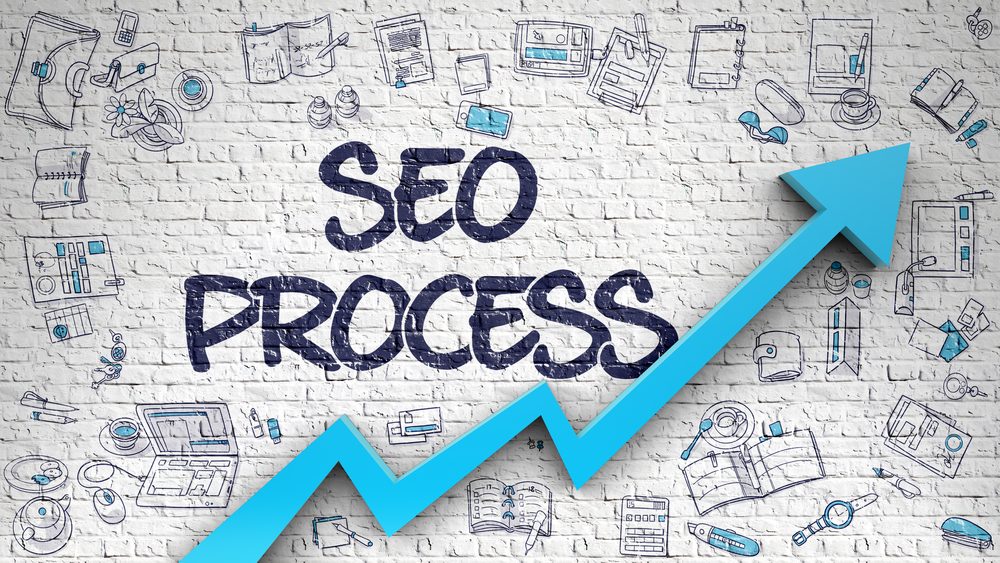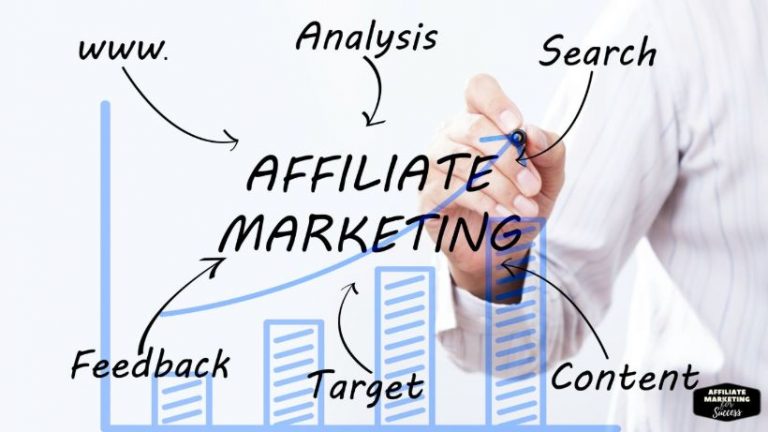Google Ranking Factors: The 2025 Guide to SEO Success
In today’s digital landscape, search engine optimization (SEO) is crucial for online business success. Even the best website can go unnoticed without proper SEO techniques. Google ranking factors play a pivotal role in determining your website’s visibility in search results. By understanding and leveraging these factors, you can significantly improve your site’s visibility and attract more traffic.
This comprehensive guide will explore the most important Google ranking factors and how to use them to enhance your SEO strategy.
What is SEO?
SEO, or search engine optimization, is the practice of improving your website’s visibility in search engine results pages (SERPs). The goal is to ensure that people searching for products or services you offer can easily find your website. SEO is essential because it allows you to be found by people searching for what you offer instead of having them stumble across your site by chance or a recommendation from someone else (which is only sometimes reliable).
Understanding Google Ranking Factors
Google uses numerous factors to determine which websites should appear at the top of their search results. While the specific factors may vary slightly between search engines, there are common elements that influence rankings. These factors can be broadly categorized into on-page and off-page SEO factors.
The different types of ranking factors include:
On-Page SEO Factors
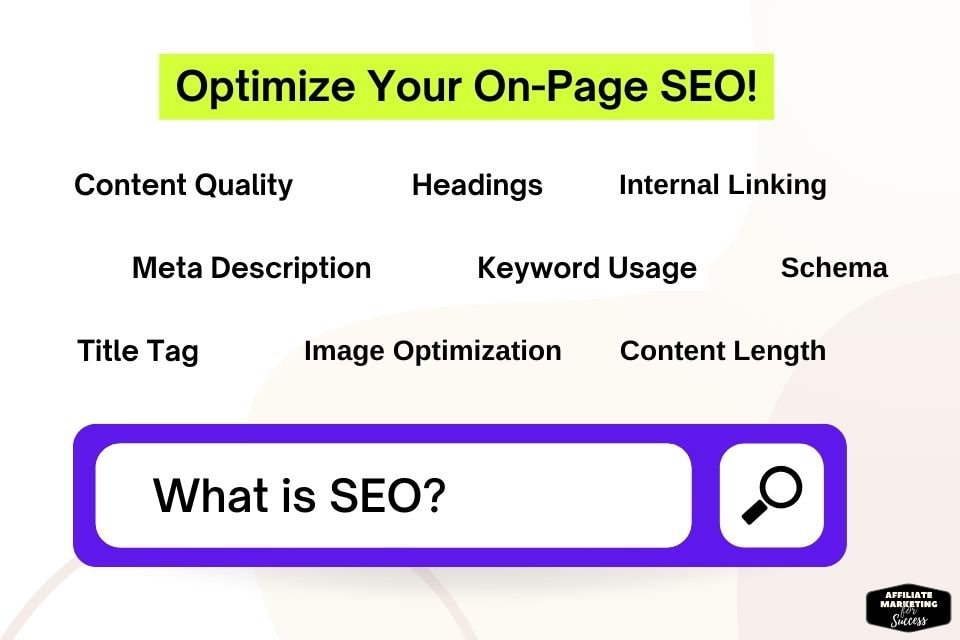
These parts of your website, like having good content and a nice design, directly affect how well it does in organic search results. On-page SEO ranking factors include keyword usage, backlinks (links to other sites), and social media activity.
Top 10 On-Page SEO Google Ranking Factors
Here is a table summarizing the latest on-page SEO ranking factors based on information from the search results:
| On-Page SEO Factor | Description |
|---|---|
| Title Tag | Include target keyword in an engaging title under 60 characters. Place important keywords close to the beginning. |
| Meta Description | Craft a compelling meta description under 155 characters that includes the target keyword. |
| URL Structure | Use short, descriptive URLs with target keyword included. Separate words with hyphens. |
| Heading Tags | Use one H1 tag with target keyword. Include related keywords in H2 and H3 subheadings. |
| Content Quality | Write in-depth, quality content that covers the topic thoroughly. Aim for at least 1800-2500 words. |
| Keyword Placement | Include keyword in first 100 words. Mention keyword and variations throughout content, but avoid stuffing. |
| Content Structure | Organize content logically with headings, short paragraphs, bullet points, and images. |
| Internal Linking | Link to relevant internal pages using descriptive anchor text. |
| Image Optimization | Use descriptive file names and alt text for images. Compress images for faster loading. |
| Page Load Speed | Optimize page speed by compressing files, using a CDN, and minimizing redirects and broken links. |
The key takeaways are:
- Strategically place your target keyword in key on-page elements like the title tag, meta description, URL, headings, and content.
- Create comprehensive, well-structured content that naturally incorporates the keyword and related terms.
- Optimize technical factors like page speed and image size to improve user experience and search engine crawling.
- Build internal links to boost page authority and help search engines understand your site structure.
By focusing on these core on-page SEO factors, you can help improve your content’s relevance and rankings in search results. However, keep in mind that search algorithms constantly evolve, so it’s important to stay up-to-date with the latest best practices.
Content Quality
The most important on-page SEO ranking factor is content that is both high-quality and useful to the user. This includes well-written and informative content optimized for target keywords and updated regularly.
Title Tag
The title tag is a crucial on-page SEO element on the search engine results page (SERP). A well-optimized title tag should accurately describe the page’s content and include relevant keywords.
Meta Description
The meta description is another on-page SEO element in the SERP. A well-written meta description should explain what the page is about and make people want to click through to the site.
Headings (H1, H2, H3)
Headings (H1, H2, and H3) help organize and structure the text on a page. A well-optimized page should have one H1 tag that accurately describes the content and multiple H2 and H3 tags that organize the subtopics.
Keyword Usage
Target keywords should be used in the content, title tag, meta description, and other on-page SEO elements. A well-optimized page should use keywords naturally, which enhances the user experience.
Image Optimization
Image optimization means using alt tags that describe the image, compressing images so they load faster, and making sure the images are the right size. Well-optimized images can improve the user experience and help search engines understand the page’s content.
Internal Linking
Internal linking refers to linking to other pages within your website. A well-optimized page should have internal links that give context, improve the user experience, and help users find relevant content and move around the site.
Content-Length
The length of the content on a page can impact its search engine ranking. A well-optimized page should have enough high-quality content to help the user and be relevant to the page’s target keywords.
Keyword Prominence
“Keyword prominence” refers to placing target keywords on a page. Keywords should stand out in the title tag, meta description and early in the content of a well-optimized page.
Page URL Structure
A page’s URL structure should be clear and short and tell the truth about what the page is about. A well-optimized page URL should include relevant target keywords and be structured logically.
Schema Markup
Schema markup is a type of microdata that helps search engines understand the content on a page. A well-optimized page should have schema markup that accurately describes the content, like reviews, product information, etc.
Outbound Links
Outbound links are links that point to other websites. A well-optimized page should have links to relevant sources or more information that give the user context and value.
Content Formatting
To organize and structure the content on a page, you can use headings, subheadings, bullet points, and other formatting elements. A well-formatted page can improve the user experience and make the content more readable.
Page Speed
Page speed is a crucial on-page SEO ranking factor. A well-optimized page should load quickly, which is better for the user and helps the page rank higher in search engines.
Keyword Synonyms
Using keyword synonyms can make a page more relevant and give the user a better experience. A well-optimized page should use similar words for its target keywords when it makes sense. This gives the page more context and improves its search engine ranking.
Off-Page Factors
Off-page SEO ranking factors include backlinks, social signals, and brand mentions that are not on your website but still affect its search engine ranking. These factors are critical to improving your website’s authority, relevance, and visibility in search engine results pages.
Top Off-Page Google Ranking Factors
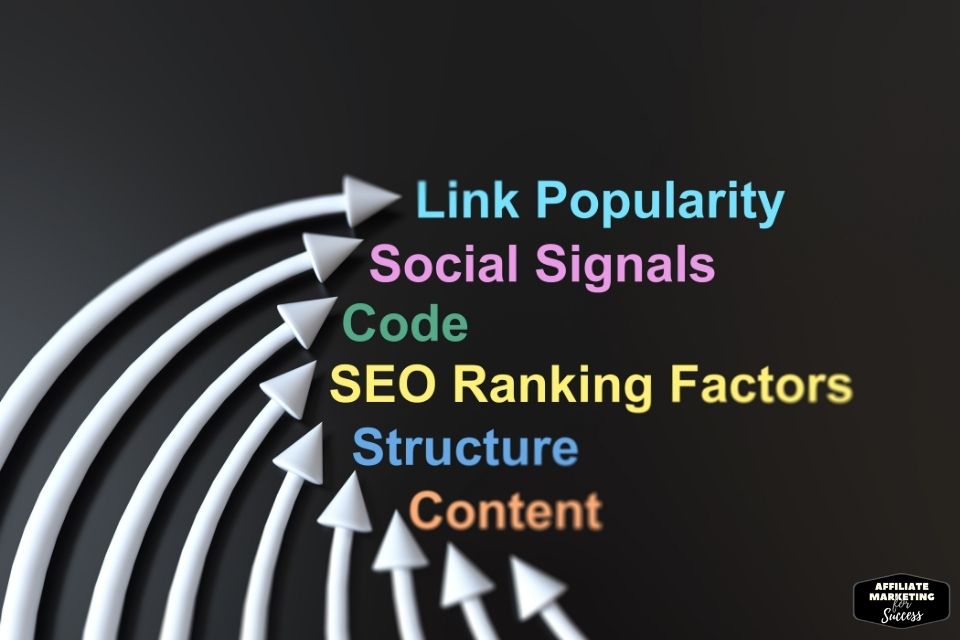
| Off-Page SEO Factor | Description |
|---|---|
| Backlinks | The number and quality of websites linking to your site. Backlinks act as “votes of confidence” and heavily influence rankings
. Key factors include:
|
| Brand Signals | Indicators that your website represents a legitimate, trustworthy brand. Factors include:
|
| Local SEO Factors | For local businesses, off-page signals that influence rankings in the local pack and geo-targeted results:
|
| Social Signals | While not a direct ranking factor, social media engagement can indirectly impact SEO by leading to more backlinks and traffic. Factors include:
|
| User Experience Signals | Factors that indicate how users interact with your site:
|
Additional Notes:
- Quality over Quantity: Focus on acquiring relevant and high-quality backlinks rather than a large number of low-quality links.
- Domain Authority: While not officially confirmed by Google, many SEO experts believe that the overall authority of a domain can influence rankings.
- Core Web Vitals: Google has announced that Core Web Vitals, which are part of page speed and user experience, will become a ranking signal.
- Mobile-Friendliness: With the increasing number of users accessing websites via mobile devices, having a mobile-friendly site is crucial for SEO success.
Backlinks
Backlinks are links from other websites that point to your website. They are among the most important off-page ranking factors because they show your site’s importance and authority.
Link Quality
Link quality is about how trustworthy and essential the sites are that link to yours. High-quality links from authoritative sites are more valuable than low-quality links from spammy sites.
Link Diversity
Link diversity refers to the variety of websites linking to your site. A diverse range of high-quality links from different domains can help boost your website’s search engine ranking.
Anchor Text
Anchor text is the clickable text that appears in a hyperlink. Search engines will rank your site higher using relevant keywords in your anchor text.
Social Signals
Social signals are how people interact with and talk about your website on social media sites. They can indicate the popularity and authority of your website.
Brand Mentions
Brand mentions are instances where your brand is mentioned on other websites, even if there is no link back to your site. They can help improve your website’s search engine ranking and brand recognition.
Citation Flow
Citation flow is a metric that measures the number of websites linking to your website. Your website is authoritative and essential in your field if it gets a lot of citations.
Trust Flow
Trust flow is a metric that measures the trustworthiness and credibility of the websites linking to your site. High-trust-flow links from authoritative sites can significantly impact your website’s search engine ranking.
Co-Citations
occur when your website is mentioned alongside other authoritative websites in your industry. They can help improve your website’s search engine ranking and authority.
Guest Blogging
Guest blogging involves writing high-quality content for other websites in your industry. It can help build your website’s authority and earn high-quality backlinks.
Broken Link Building
Broken link building involves looking for broken links on other websites and suggesting they link to your site instead. It can help earn high-quality backlinks and improve your website’s search engine ranking.
Forum Posting
Forum posting involves engaging with online forums and communities related to your industry. It can help build your website’s authority and drive traffic to your site.
Business Listings
Business listings involve creating profiles for your business on online directories and review sites. They can help improve your website’s search engine ranking and visibility.
Press Releases
Press releases are official statements that your company issues to the media. They can help improve your website’s visibility and authority, especially if reputable news outlets pick them up.
Social Bookmarking
When you use social bookmarking, you put links to your website on sites like Reddit and StumbleUpon. It can help drive traffic to your site and improve your website’s search engine ranking.
How to Boost Your SEO Strategy
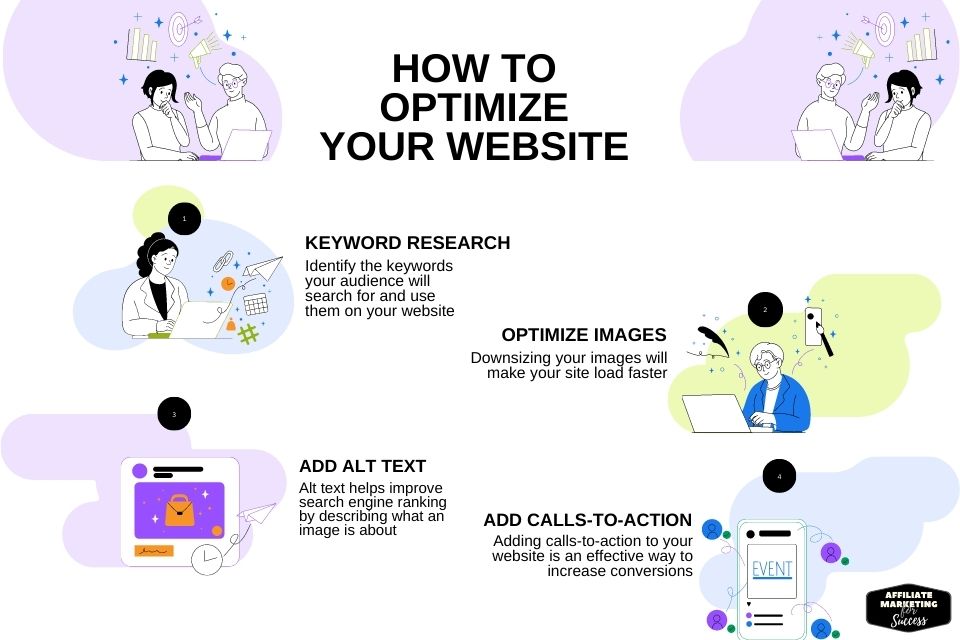
Boosting your SEO strategy can be challenging, but it’s essential to improving your website’s visibility and attracting more organic traffic. Here are some tips on how to boost your SEO strategy:
The Importance of Authoritative Content in Google Rankings
Regarding Google ranking factors, nothing is more important than quality, authoritative content. As we’ve said throughout this guide, Google gives more weight to websites whose content shows that they are knowledgeable and relevant.
This means that you need to spend time and energy making content that shows you are an expert in your field if you want to improve your SEO strategy. But it’s not just about the content itself; Google also looks at factors like website structure, header tags, and alt text to determine the quality and relevance of your content.
Adding these things to each page of your website gives your content the best chance of ranking well on search engines. Of course, content alone won’t guarantee your success; there are many other ranking factors to consider, like backlinks and mobile friendliness. But by prioritizing content quality and demonstrating your expertise to Google, you’ll be well on your way to achieving higher rankings.
Source: www.advicelocal.com
Local Results: How Relevance Determines Your Google Ranking
In the SEO world, local search results are becoming a bigger deal. But how exactly does Google determine local rankings? It all boils down to relevance, distance, and prominence. If your business has high-quality, relevant content near the user (in terms of distance) and prominent (meaning it’s well-known and trusted), chances are you’ll rank highly in local search results.
That’s why authoritative content is essential and why maintaining a strong EAT score (expertise, authority, and trustworthiness) is so important. By boosting your SEO, you can aid Google in getting your business noticed by the people who matter most: your potential customers, by increasing your relevance and prominence. Optimizing your website for search engines is key to boosting your Google ranking overall.
Essential SEO Ranking Tips for On-Page Optimization
Essential SEO Ranking Tips for On-Page Optimization is important if you want to move up in Google’s rankings for your website. On-page optimization is a set of techniques you can use on your website to make it rank better in search engines. Some of the most important things that Google looks at are the quality and relevance of your content, how fast your site is, and how you use keywords.
By following these rules, you can ensure your website is Google-friendly and rank higher in search results. It’s essential to remember that SEO is a long-term strategy, and there are no quick fixes. To keep your website optimized and up-to-date, you need to use these critical SEO ranking tips for on-page optimization and the tips from the previous blog posts regularly.
Boost Your EAT Score with Respected Expert Citations
In the world of SEO, E-A-T has become a critical factor for ranking high in Google. Citing respected experts can make a big difference in boosting your E-A-T score. It shows that you have taken the time to do research and provide accurate information to your audience. This is related to how important authoritative content is, which is a key part of getting a high ranking on Google.
Also, local results depend greatly on their relevance, so your content must fit your location. Other important things to consider are on-page optimization, mobile-friendly websites, and the importance of backlinks for exposure and domain authority. Understanding Google’s 200 ranking factors will help improve your site’s chances of high ranking. Finally, expert tips can help you elevate your SEO strategy.
If you use Google’s “incognito” mode to look up search terms, you can learn a lot about how your audience interacts with different types of content. Adding all these things to your SEO strategy will improve your E-A-T score and make it more likely that you will rank highly on Google.
Understanding Google’s 200 Ranking Factors

Source: www.singlegrain.com
Understanding Google’s 200 ranking factors is crucial for anyone aiming to boost their website’s ranking on Google. As we’ve already said, the most important thing for Google’s ranking is the quality of the content; authoritative content is a big part of that. Besides, local relevance, on-page optimization, and mobile-friendliness of websites are also some essential ranking factors. Additionally, backlinks are essential to boost a site’s domain authority and exposure.
Understanding and working on these ranking factors will have a big effect on your SEO strategy, making your website more visible and bringing more people to it.
How Google Evaluates Pages to Determine Relevant Results
For search engine optimization (SEO), it’s important to know how Google looks at pages to determine the most relevant results. As we’ve already talked about, the quality of your content and how well it fits your audience are two of the most important ranking factors. Local results also depend on relevance, particularly for small businesses with physical locations.
On-page optimization, such as making sure your content is the right length and using keywords in the right way, is another important step to take to improve your SEO strategy.
EAT, or expertise, authoritativeness, and trustworthiness, is yet another factor that Google raters use to evaluate the credibility of your website’s content. Google also looks at many other ranking factors and signals, like how fast a page loads and how mobile-friendly it is, to determine the order of search results. You can boost your site’s domain authority and exposure by researching search terms incognito and building good backlinks. If you understand and use these factors, your website will increase rankings and get more relevant traffic.
Using Incognito Mode to Research Google Search Terms
Using Google’s “Incognito” mode to research search terms is a powerful SEO technique to help your site rank higher. By searching for terms in Incognito mode, you can see the results without personalization or bias based on your search history. This allows you to understand better how your target audience searches for your content. With authoritative content and on-page optimization, this strategy can help your website appear higher in local search results and be seen as more relevant. So, if you want to stay ahead of the competition and get more people to visit your website, don’t forget to research in Incognito mode.
The Importance of Mobile-Friendly Websites for SEO
With the growing number of mobile users, it is no surprise that mobile friendliness is now considered a ranking factor by search engines like Google. Having a mobile-friendly website is crucial to boosting your SEO strategy. It helps you rank higher in search engine results and gives your audience a better experience using your site. In addition to ensuring the experience is the same on all devices, mobile optimization includes things like how quickly a page loads, how easy it is to read, and how responsive the design is. All of these things contribute to higher search engine rankings. As mobile usage continues to rise, so does the importance of having a mobile-friendly website in your SEO strategy.
Source: marketersagency.us
Backlinks: How They Boost Your Site’s Domain Authority & Exposure
Having high-quality backlinks is one of the most important things you can do to improve your website’s Google ranking. In this section, we will delve into how they work to boost your site’s domain authority and exposure. Backlinks are links from other websites that lead back to your site. When a reputable site links to yours, it is seen as a vote of confidence in your content, which can improve your site’s authority and visibility in search results. This is why focusing on earning high-quality backlinks from authoritative websites is important. By doing so, you can increase your website’s exposure, relevancy, and credibility in the eyes of Google. In the next section, we’ll show you how to get these valuable backlinks with the help of an expert.
Expert SEO Tips for Boosting Your Website’s Google Ranking
In the last part of this blog, professional SEO tips are given to help your website rank higher on Google. These tips build on the previous sections, emphasizing the importance of authoritative content, local results, on-page optimization, reputable citations, understanding Google’s ranking factors, researching search terms, mobile friendliness, and backlinks. Consider using schema markup, optimizing meta descriptions, analyzing and improving your site’s click-through rate, and regularly updating old content to improve your SEO strategy even more. By using these expert tips and keeping up with Google’s algorithms, you can improve your website’s Google ranking and get more organic traffic.
FAQs
Conclusion
In conclusion, understanding Google ranking factors is crucial for boosting your SEO strategy. Optimizing your website according to these factors can significantly improve your website’s visibility and attract more organic traffic.
As discussed in this blog, there are numerous factors that Google considers when ranking websites. These include website speed, mobile-friendliness, content relevance and quality, backlinks, and user experience.
To ensure that your website ranks higher in Google’s search results, it’s essential to focus on these factors and continually improve your website’s performance.
By implementing these strategies, you can gain a competitive edge in the online market and increase your website’s authority and relevance.
References
| Study Name | Brief Description | Link |
| Top Ranking Factors | An overview of the top ranking factors for Google search results based on a survey of industry experts. | https://www.searchenginejournal.com/ranking-factors/top-ranking-factors/ |
| Google Ranking Factors | A comprehensive guide to Google ranking factors, including on-page, off-page, and technical SEO factors. | https://backlinko.com/google-ranking-factors |
| Google’s 200+ Ranking Factors | A detailed list of Google’s 200+ ranking factors based on a study of over 10,000 high-ranking websites. | https://www.pageonepower.com/google-ranking-factors |
| Google Ranking Factors for E-commerce | An in-depth analysis of Google ranking factors specifically for e-commerce websites. | https://blog.shift4shop.com/google-ranking-factors |
| Google Ranking Factors for Law Firms | An overview of Google ranking factors relevant to law firms and legal professionals. | https://lawrank.com/seo-for-lawyers/google-ranking-factors/ |
| SEO Best Practices for Websites | A guide to implementing SEO best practices for websites, including on-page optimization, content strategy, and technical SEO. | https://www.mtu.edu/umc/services/websites/seo/ |
| An In-Depth Guide to Google Ranking Factors | A comprehensive guide to Google ranking factors, including on-page, off-page, and technical SEO factors. | https://www.searchenginewatch.com/2017/10/27/an-in-depth-guide-to-google-ranking-factors/ |
| Google Ranking Factor for SEO | A detailed analysis of the most important Google ranking factors for SEO and how to optimize for them. | https://www.scalenut.com/blogs/google-ranking-factor-for-seo |
| The Ultimate Guide to Google Ranking Factors | A comprehensive guide to Google ranking factors, including on-page, off-page, and technical SEO factors. | https://devinschumacher.com/google-ranking-factors/ |
| Improve Your Local Ranking on Google | A guide to optimizing your website and Google My Business listing for better local search rankings. | https://support.google.com/business/answer/7091?hl=en |
| The Top Google Ranking Factors in 2020 | An analysis of the top Google ranking factors for 2020, including on-page, off-page, and technical SEO factors. | https://www.wordstream.com/blog/ws/2020/09/09/google-ranking-factors |
| Ahrefs’ Study of 2 Million Featured Snippets | An analysis of 2 million featured snippets to determine the factors influencing them. | https://ahrefs.com/blog/google-ranking-factors/ |
| Local Ranking Factors | An overview of the most crucial local SEO ranking factors for small businesses. | https://moz.com/learn/seo/local-ranking-factors |
| The Anatomy of a Google Search Result | An infographic that breaks down the different elements of a Google search result and how they are ranked. | https://blog.hubspot.com/marketing/google-ranking-algorithm-infographic |
| How Google Search Works | An overview of how Google search works, including how it crawls and indexes web pages and ranks search results. | https://www.google.com/search/howsearchworks/how-search-works/ranking-results/ |
| Yellowhead’s Guide to Google Ranking Factors | A guide to Google ranking factors, including on-page, off-page, and technical SEO factors. | https://www.yellowhead.com/blog/google-ranking-factors/ |
| SEO Ranking Factors for 2021 | A guide to the most important SEO ranking factors for 2021, including on-page optimization, content, and backlinks. | https://www.semrush.com/blog/seo |
I’m Alexios Papaioannou, an experienced affiliate marketer and content creator. With a decade of expertise, I excel in crafting engaging blog posts to boost your brand. My love for running fuels my creativity. Let’s create exceptional content together!

